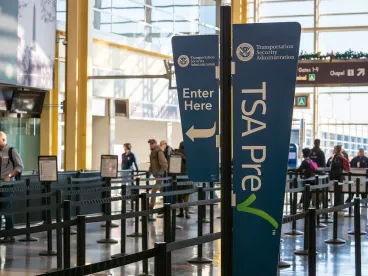Many people are employed at airports. Of those, many individuals work within the terminals for private companies. Federal law requires that those employees who work in the terminals must go through security checks – just like travelers.
Jesus Cazares was one of those employees, working at Los Angeles International Airport (LAX). In bringing a lawsuit against his employer, Host International, Inc. – which operates the Admiral Club at LAX – Cazares alleged that he and his fellow employees were not paid for the time they spent passing through airport security checks en route to their work at the Admiral Club. The district court rejected the notion that such time is compensable under California law and, earlier this month, the Ninth Circuit agreed in Cazares v. Host International, Inc.
Relying on the California Supreme Court’s decision in Frlekin v. Apple, Inc., which we discussed here, the Ninth Circuit concluded that, because Cazares was unable to show that he was subject to the control of his employer during the security checks, he was unable to state a claim for unpaid wages under California law. Specifically, the Court concluded that the allegations made by Cazares “provide[] none of the factual predicates contemplated by the framework set out by the California Supreme Court . . . to support an inference that Host, the employer, had any ‘level of control’ over Cazares during the TSA security check process. This factor is ‘determinative’ in assessing ‘whether an activity is compensable under the “hours worked” control clause.’”
Cazares also brought a meal period claim, alleging that he “was impermissibly subjected to on-premises meal breaks because, due to the TSA security process, he did not have time to leave the airport and return within thirty minutes.” The Ninth Circuit rejected that contention, too, finding that Host’s only obligation was to allow Cazares to leave the Admiral Club – not the terminal entirely – and because Cazares made no allegation that he was not permitted to leave the Admiral Club, his meal period claim failed.
Similar to his meal period claim, in support of his rest period claim, Cazares alleged that Host failed to relieve him of all duties and relinquish control over how he spent his time during his rest periods because he “had to spend several minutes walking to the designated rest area.” Following California law, the Ninth Circuit rejected this notion, too, because Cazares had failed to allege “that (1) he was required to take his rest period at a particular, remote designated area and (2) there were no other areas where he . . . could take rest periods that were closer than the designated area.”
The Cazares decision is a welcome decision for those employers who employ persons at airports. More broadly, the decision confirms that employers generally need not compensate employees for time spent outside employers’ control.



 />i
/>i

